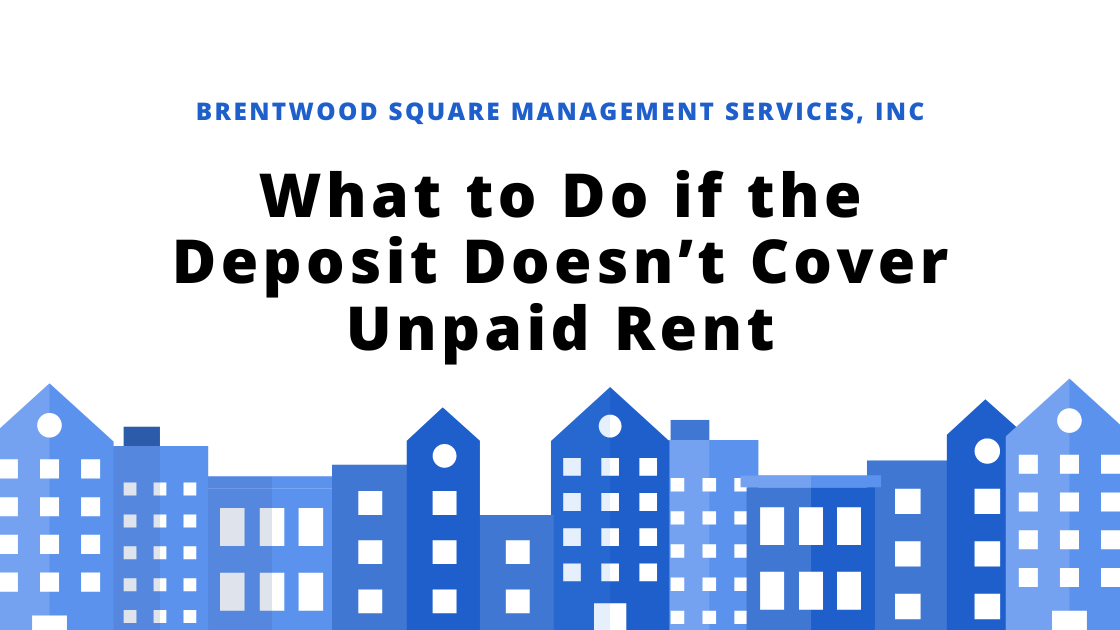
If you own a rental property, you should familiarize yourself with your local security deposit laws. You probably are already charging tenants a deposit before moving in.
While security deposits are meant to provide landlords with a safety net against financial losses, there are instances where the amount paid upfront is not enough to cover unpaid rent or other damages.
In this article, the experts at Brentwood Square Management Services, Inc. will tell you what to do if you ever find yourself in this situation. Keep reading to learn how to recover unpaid rent when a tenant’s deposit isn’t enough to cover it! Keep reading to learn more!
Making Deductions from the Security Deposit
If you’re renting out a house in Nashville, TN, charging tenants a security deposit is a must. Otherwise, you are at higher risk of financial losses in case tenants damage your property or stop paying rent.
Typically, a deposit should be the equivalent of one or two months' rent. However, you should check out your local rental laws to ensure there aren’t any limitations to how much you can charge tenants.

If a tenant fails to comply with the lease terms or leaves your property in bad condition, you can make deductions from their deposit. In Tennessee, for instance, landlords are allowed to keep all or part of a tenant’s deposit to cover the following expenses:
- Unpaid rent: If a tenant fails to pay rent during the duration of their lease, their landlord can deduct the amount owed from the security deposit. To justify this deduction, landlords should keep detailed records of rent payments and any notices given to the tenant regarding overdue amounts.
- Property damage: Security deposits can be used to cover costs for damages beyond normal wear and tear. This includes broken windows, holes in walls, damaged flooring, or any other significant harm caused by the tenant or their guests. To avoid tenants disputing the deductions, you must conduct a thorough move-in and move-out inspection, documenting the property's condition with photos and written notes.
- Unpaid utility bills: Landlords can deduct from the security deposit if the tenant fails to settle their utility bills before vacating the property. This includes bills for electricity, water, gas, and other utilities that the tenant was responsible for during their tenancy. To support this deduction, landlords should provide copies of the outstanding bills and an itemized statement showing the amounts deducted from the security deposit.
- Lease violations: Landlords can deduct from the deposit to cover any breaches to the lease a tenant incurred. This includes making unauthorized renovations, failing to clean the property before moving out, or fees for breaking the lease early.

What to Do When the Security Deposit Falls Short
Sometimes the security deposit might not be enough to cover the losses landlords incur. For instance, if a tenant fails to pay several months of rent, their deposit might not be enough to cover what is owed.
Luckily, there are plenty of things you can do to solve this issue, including the following:
Keep Open Lines of Communication
Talking with tenants can prevent minor problems from escalating to legal disputes. When giving back a tenant their deposit, you must also provide them with an itemized list of deductions.
If you notice that the owed amount is higher than the deposit, you must let them know immediately. Communicating with the tenant can help you find an amicable way of resolving the issue, whether it’s having them pay you back in small installments or by sending a check.
Issue a Legal Notice
If tenants refuse to pay back the money they owe you, you’ll need to issue a legal notice. You can use a payment notice or a demand letter to let tenants know the amount owed and the due date.
In many cases, this legal document should be enough to encourage tenants to pay what they owe without having to escalate the issue further.
File a Lawsuit in Small Claims Court

If the tenant ignores your payment notice, you will have to file a lawsuit at small claims court. By providing detailed records of missed rent payments and any notices given to the tenant regarding overdue amounts, the court is more than likely to rule in your favor, forcing the tenant to pay the amount owed.
Small claims court is a great way to resolve minor disputes between landlords and tenants. This informal process tends to be quicker and simpler than higher courts. Plus, landlords aren’t required to hire a legal professional in most cases. For instance, in Tennessee, landlords can settle minor disputes without hiring an attorney if the amount claimed is less than $25,000.
Report It to the Credit Bureau
If a tenant refuses to pay you for their unpaid rent even after being obliged by the court, you should consider reporting it to the Credit Bureau.
When a landlord reports a tenant to the Credit Bureau for unpaid rent, their debt will appear on their credit report for up to seven years. This will significantly lower their credit score.
Many tenants may feel compelled to pay back what they owe in order to get this erased from their records.
Bottom Line
Charging tenants a security deposit is a great way to keep yourself protected from financial losses. In most states, deposits can be used to cover the costs of repairs for damage beyond normal wear and tear, unpaid rent, unpaid utility bills, and even cleaning services.
However, there can be instances where the deposit doesn’t cover the full costs incurred. If you ever find yourself in such a predicament, you should reach out to the tenant to resolve the issue amicably. If this doesn’t work, you can issue a legal notice or file a lawsuit in small claims court to get your money back.
If you have more questions about security deposit laws in Tennessee, contact Brentwood Square Management Services, Inc. today!
